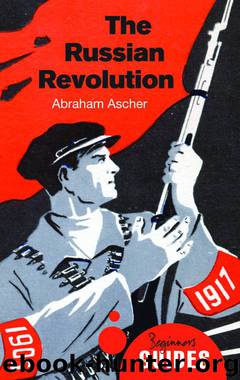The Russian Revolution by Abraham Ascher

Author:Abraham Ascher [Abraham Ascher]
Language: eng
Format: epub
ISBN: 9781780743882
Publisher: Oneworld Publications
5
Bolsheviks in power
The Kornilov rebellion was essentially a test of strength between Kornilov, who wished to save Russia from Bolshevism and to conduct a successful war against Germany, and Kerensky, who also wanted to win the war and in addition, turn Russia into a democracy. Each of them believed that he was the only one who could save Russia from the abyss. The victor in this fierce conflict, strange as it may sound, was Lenin. The Bolsheviks had supported the struggle against Kornilov, but not because they supported the Provisional Government. Lenin explained their position in a letter of 30 August to the Central Committee of the Russian Social Democratic Labor Party:
We will fight, we are fighting against Kornilov, even as Kerensky’s troops do, but we do not support Kerensky. On the contrary, we expose his weakness… without renouncing the task of overthrowing Kerensky right now; we shall approach the task of struggling against him in a different way, namely, we shall point out to the people… the weakness and vacillation of Kerensky. This has been done before. Now, however, it has become the main thing.
At this time, a group of sailors visited Trotsky and asked him, ‘Isn’t it time to arrest the government?’ ‘No, not yet,’ Trotsky replied. ‘Use Kerensky as a gun-rest to shoot Kornilov. Afterward we will settle with Kerensky.’
Militarily, the Bolsheviks benefited from Kornilov’s rebellion. In its anxiety to create a fighting force against Kornilov’s advancing troops, the Provisional Government had permitted the indiscriminate arming of workers. Many did not return their arms after the rebellion had fizzled out, and this made possible the formation of the first units of the Red Guard under the command of the soviet. Before the revolt, the soviet could count on the support of some self-organized militias. Within a few weeks, the Red Guards numbered 25,000. ‘The army that rose against Kornilov,’ wrote Trotsky, ‘was the army-to-be of the October [November] Revolution.’ Although Trotsky was exaggerating somewhat, the nucleus of the Bolshevik armed forces was created at that time.
Perhaps the most far-reaching consequence of the whole affair was the general demoralization. The rank and file of the army lost what little faith they still had in their officers. Furthermore, soldiers demanded that instead of being treated leniently, the generals who had supported the rebellion ought to suffer the same punishment they were so eager to apply to disobedient men in the ranks. ‘When it was realized,’ Chernov wrote, ‘that discipline and capital punishment were for soldiers, not for generals, the front swelled with anger and turned black like the sea before a tempest. The Bolsheviks had only to catch the favoring wind and fill their sails.’ A new round of desertions, as well as increasing physical attacks on officers, speeded the disintegration of the tsarist army.
Everywhere, Bolsheviks and right-wingers whispered that Kerensky had been in accord with Kornilov on the necessity of a dictatorship, and that the Prime Minister had betrayed the general only under pressure from the soviets. Inevitably, these charges and revelations undermined the confidence of the masses in the Kerensky government.
Download
This site does not store any files on its server. We only index and link to content provided by other sites. Please contact the content providers to delete copyright contents if any and email us, we'll remove relevant links or contents immediately.
| Africa | Americas |
| Arctic & Antarctica | Asia |
| Australia & Oceania | Europe |
| Middle East | Russia |
| United States | World |
| Ancient Civilizations | Military |
| Historical Study & Educational Resources |
Red Famine: Stalin's War on Ukraine by Anne Applebaum(2929)
Midnight in Chernobyl by Adam Higginbotham(2542)
Chernobyl by Serhii Plokhy(2536)
Midnight in Chernobyl: The Untold Story of the World's Greatest Nuclear Disaster by Adam Higginbotham(2226)
The House of Government by Slezkine Yuri(2200)
Red Shambhala by Andrei Znamenski(2193)
The Gulag Archipelago (Vintage Classics) by Aleksandr Solzhenitsyn(2096)
Red Notice by Bill Browder(2070)
All the Kremlin's Men by Mikhail Zygar(2064)
From Cold War to Hot Peace by Michael McFaul(2029)
Putin's Labyrinth(2016)
From Russia with Lunch by David Smiedt(1971)
The Future Is History by Masha Gessen(1905)
A People's Tragedy by Orlando Figes(1864)
The Romanovs by Simon Sebag Montefiore(1820)
How to Tame a Fox (and Build a Dog): Visionary Scientists and a Siberian Tale of Jump-Started Evolution by Lee Alan Dugatkin & Lyudmila Trut(1770)
Putin's Labyrinth: Spies, Murder, and the Dark Heart of the New Russia(1752)
The Lost Spy by Andrew Meier(1745)
Art and Revolution by John Berger(1721)
